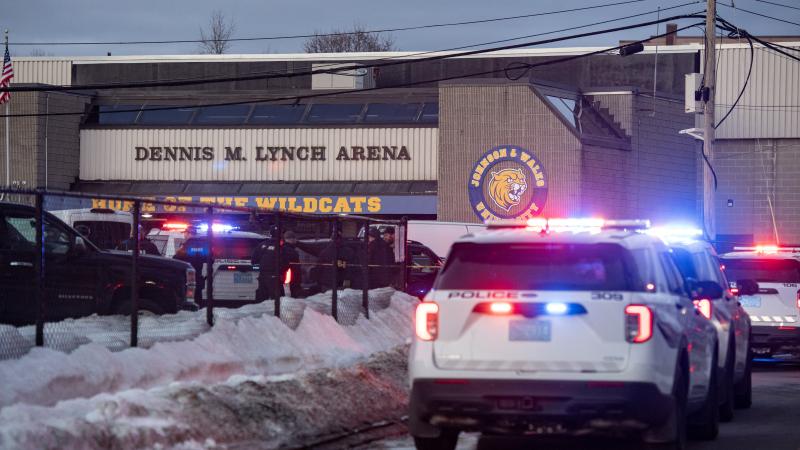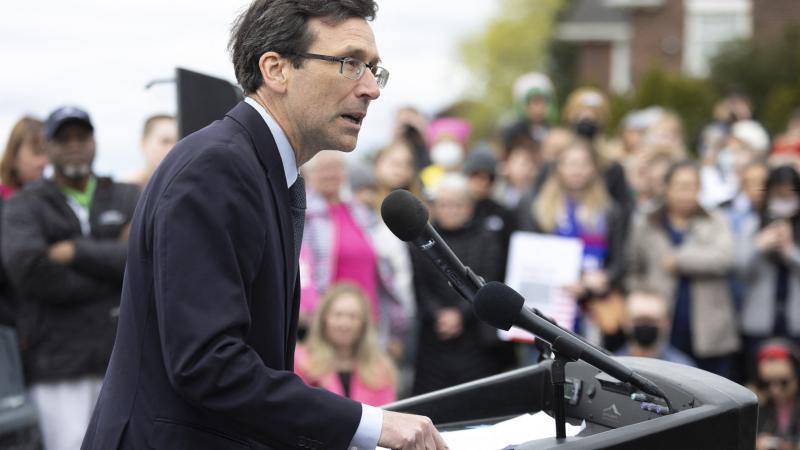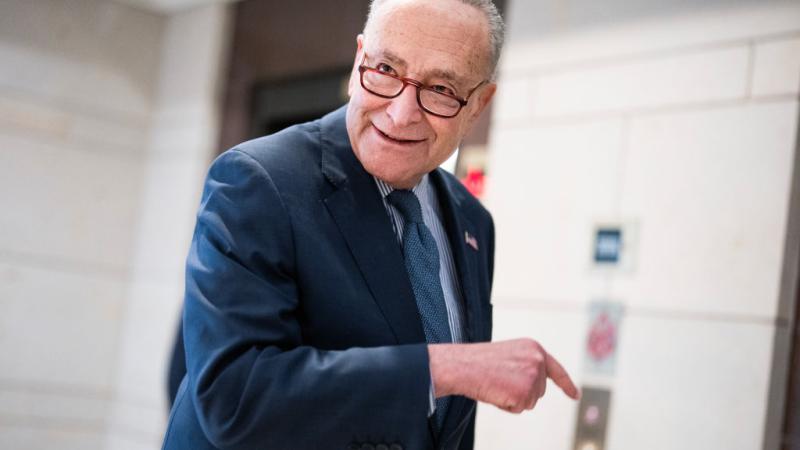'Food security is national security': Hegseth says DoD serious about Chinese farmland near US bases
Pete Hegseth and other Trump Administration leaders say they are serious about protecting U.S. agriculture and U.S. bases from China and other adversaries.
Secretary of Defense Pete Hegseth declared that the Pentagon is getting serious about the threats posed by Chinese ownership of farmland near U.S. military bases and installations, with the Defense Department declaring that “food security is national security.”
Secretary of Agriculture Brooke Rollins rolled out a new “National Farm Security Action Plan” for the U.S. Department of Agriculture (USDA) on Tuesday, where she was joined by Hegseth, Attorney General Pam Bondi, and Secretary of Homeland Security Kristi Noem, with the group uniting to warn about the threats posed to U.S. agriculture and to U.S. national security by foreign adversaries.
“Foreign ownership of land near strategic bases and U.S. military installations poses a serious threat to our national security,” Hegseth said Tuesday. “The Farm Security Plan will put America First and keep our bases across the homeland secure.”
The USDA said Tuesday that the National Farm Security Action Plan “takes aggressive action across seven critical areas.” Among those areas, USDA said, are the need to “Secure and Protect American Farmland – Address U.S. foreign farmland ownership from adversaries head on. Total transparency. Tougher penalties.” The USDA said it would also “crack down on bio-threats before they ever reach our soil” and “Protect Critical Infrastructure — Farms, food, and supply chains are national security assets — and will be treated as such.”
Hegseth: A plan that "Puts America First"
Hegseth said Tuesday that “energy security, food security, water security is national security” and that “we care about homeland security” at the Defense Department.
"And so when you look at our bases here in the United States or around the world, we ought to know who owns that land around strategic bases. Where are they from? Are they Americans, and if not, why? … Your plan helps us address that,” Hegseth told Rollins. “We're excited to partner with you. Thank you for your leadership. Anything we can do, let us know, and this is all part of securing America and American citizens and putting America first — it's common sense for us."
A graphic produced by USDA and shared by the Defense Department depicts Chinese land ownership near 17 U.S. military bases and installations: Fort Lewis in Washington, Camp Pendleton and Fort Irwin in California, Yuma Proving Ground in Arizona, Hill Air Force Base and Dugway Proving Ground in Utah, Grand Forks Air Force Base in North Dakota, Fort Hood and Camp Bullis in Texas, Whiteman Air Force Base and Fort Leonard Wood in Missouri, Fort Benning in Georgia, Wright Patterson Air Force Base in Ohio, MacDill Air Force Base and Patrick Space Force Base in Florida, Fort Bragg in North Carolina, and Naval Station Norfolk in Virginia.
"As someone who's charged with leading the Defense Department, I want to know who owns the land around our bases and strategic bases, and getting an understanding of why foreign entities, foreign companies, foreign individuals, might be buying up land around those bases. That's something I should be paying attention to, on behalf of the American people, on behalf of my department, and on behalf of the president,” Hegseth said Tuesday. “It’s common sense.”
One illustrative example is China’s Fufeng Group purchasing a large swatch of land near a key U.S. air force base in North Dakota.
Fufeng Group, a huge agricultural company with significant links to China’s government, purchased 370 acres as a location for its new wet corn mill in the agribusiness park just a short distance from Grand Forks Air Force Base in North Dakota. That base is home to the 319th Reconnaissance Wing, responsible for high-altitude intelligence, surveillance and reconnaissance in support of combat missions being deployed.
Warnings by top-level government bodies ignored
The U.S.-China Economic and Security Review Commission warned in May 2022 that Fufeng has “ties” to the Chinese government and to the Chinese Communist Party. The commission noted the U.S. air base “houses some of the United States’ top intelligence, surveillance, and reconnaissance capabilities.”
After months of consideration, the Committee on Foreign Investment in the United States (CFIUS) declined to block the project despite urging from North Dakota’s Republican senators and other congressional Republicans on Capitol Hill. The U.S. Air Force warned of the significant national security threat, and the Grand Forks City Council voted to end the project in February 2023 — only after CFIUS refused to act.
The Defense Department said Tuesday that “while keeping farmland in the hands of American farmers rather than businesses affiliated with adversarial foreign governments secures the ability of the U.S. to always produce food to feed Americans, it serves a second purpose as well.” The department said that “in some cases, farmland purchased by investors associated with adversarial foreign governments is situated around U.S. military installations, which means foreign ownership of that land is both a threat to America's ability to ensure its own food supply and also a threat to broader American security because it puts those installations at risk.”
The USDA on Tuesday released a “Farm Security Is National Security” strategy document, stating that the department “will work alongside State and Congressional partners where applicable to take swift legislative or executive action to end the direct or indirect purchase or control of American farmland by nationals from countries of concern or other foreign adversaries.”
China holds less U.S. land than Canadians
The USDA Farm Service Agency’s annual report on foreign ownership of land said that, as of the end of 2023, “foreign persons held an interest in nearly 45 million acres of U.S. agricultural land,” which made up “3.5 percent of all privately held agricultural land and 2 percent of all land in the United States.”
“Canadian investors own the largest amount of reported foreign-held agricultural and non-agricultural land, with 33 percent, or 15.3 million acres,” the USDA report said, adding that “China held 277,336 acres, which is slightly less than 1 percent of foreign-held acres.”
The USDA report said that “Chinese investments in U.S. agricultural land are spread across the country” and that “the states with the largest Chinese holdings” are Texas at 123,708 acres, North Carolina at 44,263 acres, Missouri at 42,905 acres, Utah at 33,035 acres, and Florida at 12,798 acres — with those states totaling “93 percent of the acreage associated with Chinese filings.”
The foreign land ownership report stressed that “the acreage associated with China—or any other country discussed in this report—should be interpreted as a minimum” because “for example, a Chinese investor which is part of a multi-country investment group, or having a multi-country complex organizational structure, may well fall in the ‘no predominant country’ category. In such cases, China’s interest would be under-represented.”
The Government Accountability Office (GAO) had warned in 2024 about USDA’s handling of information on foreign land ownership. The GAO said that USDA “does not share timely data on foreign investments in agricultural land” collected under the Agricultural Foreign Investment Disclosure Act (AFIDA).
“DOD officials noted they need AFIDA information that is more up-to-date and more specific, and they need to receive this information more than once a year,” the GAO said, adding that “additional targeted information on foreign investments in U.S. agricultural land could improve DOD’s ability to identify potential investments of concern earlier in the process” and that “more up-to-date information could help CFIUS and DOD more quickly mitigate potential national security risks associated with agricultural land.”
USDA asking for the public's help
The USDA’s new strategy document said Tuesday that the department “is launching a new online portal for farmers, ranchers, and others to report possible false or failed reporting and compliance with respect to AFIDA” and that “the portal will receive and review claims of adversarial foreign influence on federal, state, and local policymakers with respect to purchases of U.S. farmland and business dealings in other facets of U.S. agricultural supply chains.”
Hegseth said Tuesday that "we would be asleep at the wheel if we were not fully a party to an effort like this to ensure that our nation had the food supply it needs, but specifically our troops have what they need on our bases, so that in those moments, you can rely on us here in the United States to provide that security.” The defense secretary warned that “no longer can foreign adversaries assume we're not watching and we're not paying attention and we're not doing something about it — because we are."
Just the News published in June that two Chinese scientists charged in a plot to smuggle a dangerous pathogen into the United States worked at an American laboratory led by yet more senior Chinese scientists were funded by the Biden administration, according to federal spending records and the researchers' own disclosures. Yunqing Jian, 33, and Zunyong Liu, 34, were charged Tuesday with smuggling a fungus called Fusarium graminearum into the United States in 2024. The fungus is classified in the scientific literature as a “potential agroterrorism weapon” because it affects wheat, barley, maize, and rice by causing “head blight,” according to the Justice Department.
A fungus among us, courtesy of China
The USDA pointed to this incident when explaining its new initiative.
“Recent events highlight the critical need for this action. Last month, the U.S. Department of Justice charged foreign nationals, including a Chinese Communist Party member, with smuggling a noxious fungus into the United States — a potential agroterrorism weapon responsible for billions in global crop losses,” the USDA said Tuesday. “The scheme involved a U.S. research lab and highlighted a disturbing trend: America’s enemies are playing the long game — infiltrating our research, buying up our farmland, stealing our technology, and launching cyberattacks on our food systems. These actions expose strategic vulnerabilities in America’s food and agriculture supply chain.”
“Enough is enough,” the USDA declared.
The Facts Inside Our Reporter's Notebook
Links
- declaring
- rolled out
- âNational Farm Security Action Planâ
- said
- said
- said
- told
- shared
- Fort Lewis
- Camp Pendleton
- Fort Irwin
- Yuma Proving Ground
- Hill Air Force Base
- Dugway Proving Ground
- Grand Forks Air Force Base
- Fort Hood
- Camp Bullis
- Whiteman Air Force Base
- Fort Leonard Wood
- Fort Benning
- Wright Patterson Air Force Base
- MacDill Air Force Base
- Patrick Space Force Base
- Fort Bragg
- Naval Station Norfolk
- said
- significant links
- warned
- RQ-4 Global Hawk drone
- despite urging
- warned
- voted
- said
- âFarm Security Is National Securityâ
- annual report
- warned
- Agricultural Foreign Investment Disclosure Act
- strategy document
- said
- revealed
- âpotential agroterrorism weaponâ
- said













